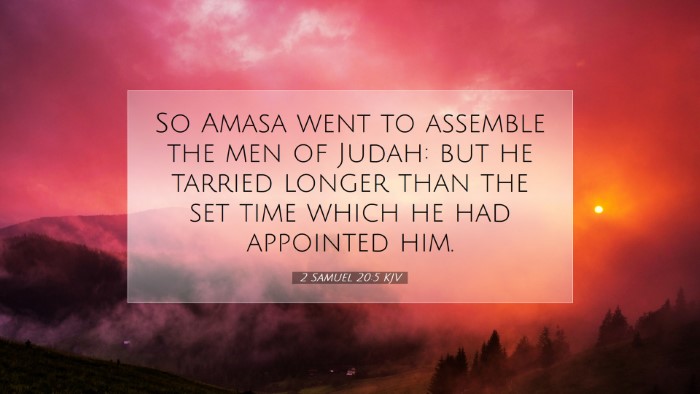Commentary on 2 Samuel 20:5
Verse: “So Amasa went to assemble the men of Judah: but he tarried longer than the set time which he had appointed him.”
Introduction
This verse describes Amasa's delay in gathering the forces of Judah to confront the rebellion led by Sheba, son of Bichri. The consequences of this delay are significant, reflecting on themes of leadership, loyalty, and the urgency required in times of crisis.
Contextual Background
The narrative in 2 Samuel 20 unfolds in a tumultuous time for David’s kingdom. Following the tumultuous events of Absalom’s rebellion, Israel is once again confronted by strife. Amasa was appointed by David as commander of the army in place of Joab, which brought about a significant shift in military leadership and loyalty within David's ranks.
Verse by Verse Analysis
Amasa's Role: Amasa was not only a military leader but also a pivotal figure in reinstating order within the fractured kingdom. His hesitation serves as a crucial element in the unfolding events, revealing both the political and social tensions present.
- Leadership challenges: Amasa’s effectiveness was critical as he sought to unify the men of Judah.
- Time Management: The delay signifies not merely a logistical failure but may also reflect on a lack of urgency in responding to the rebellion, raising questions about priorities in leadership.
Theological Insights
From this verse, theologians and scholars can extract several deeper meanings regarding God's providence and the nature of human leadership:
- Divine Sovereignty: God’s will is often accomplished despite human shortcomings. Amasa's delay is a reminder that human plans may falter, but God remains in control.
- Consequences of Delay: The narrative suggests that hesitation in action can have dire consequences. This reflects the nature of leadership where prompt decision-making is vital, especially in spiritual contexts.
Commentary Insights
Matthew Henry's Commentary: Henry emphasizes the importance of Amasa's role and the weight of his responsibility. He notes that "Amasa's delay would have caused a delay in the justice that needed to be dispensed in the kingdom.” This highlights the expectation of immediate action in leadership roles.
Albert Barnes' Commentary: Barnes points out the significance of Amasa's procrastination: “This failure to meet the appointed time served to prolong the disorder and could have disastrous ramifications, as it allows Sheba's rebellion room to grow.” His insights suggest a vital principle: the need for diligence and timeliness in leadership in the face of conflict.
Adam Clarke's Commentary: Clarke adds depth by interpreting Amasa's delay not just as a matter of logistics but as indicative of his potential indecision or lack of resolve. He notes, “In the governance of God's people, leaders must exhibit not only skill but also a commitment to decisive action to maintain order and peace.”
Lessons for Pastors and Leaders
- Urgency in Leadership: Leaders are often tasked with urgent matters requiring swift decisions. Reflecting on Amasa's delay can prompt introspection on how leaders can prioritize their time and responsibilities.
- Trust in God’s Timing: While timeliness is critical, leaders must also trust in God’s sovereign timing, understanding that they are part of a larger divine narrative.
- Accountability: Amasa's story serves as a reminder of the accountability that comes with leadership. Pastors and church leaders should model timely and faithful responses to the needs of their congregations.
Conclusion
2 Samuel 20:5 encapsulates a moment of critical delay that holds vast implications for leadership within the community of faith. The interplay of human decision-making and divine providence is vital in understanding the challenges leaders face. Ultimately, this verse serves as a stark reminder of the responsibilities leaders bear and the consequences of their choices, urging reflection and commitment to faithful stewardship.


